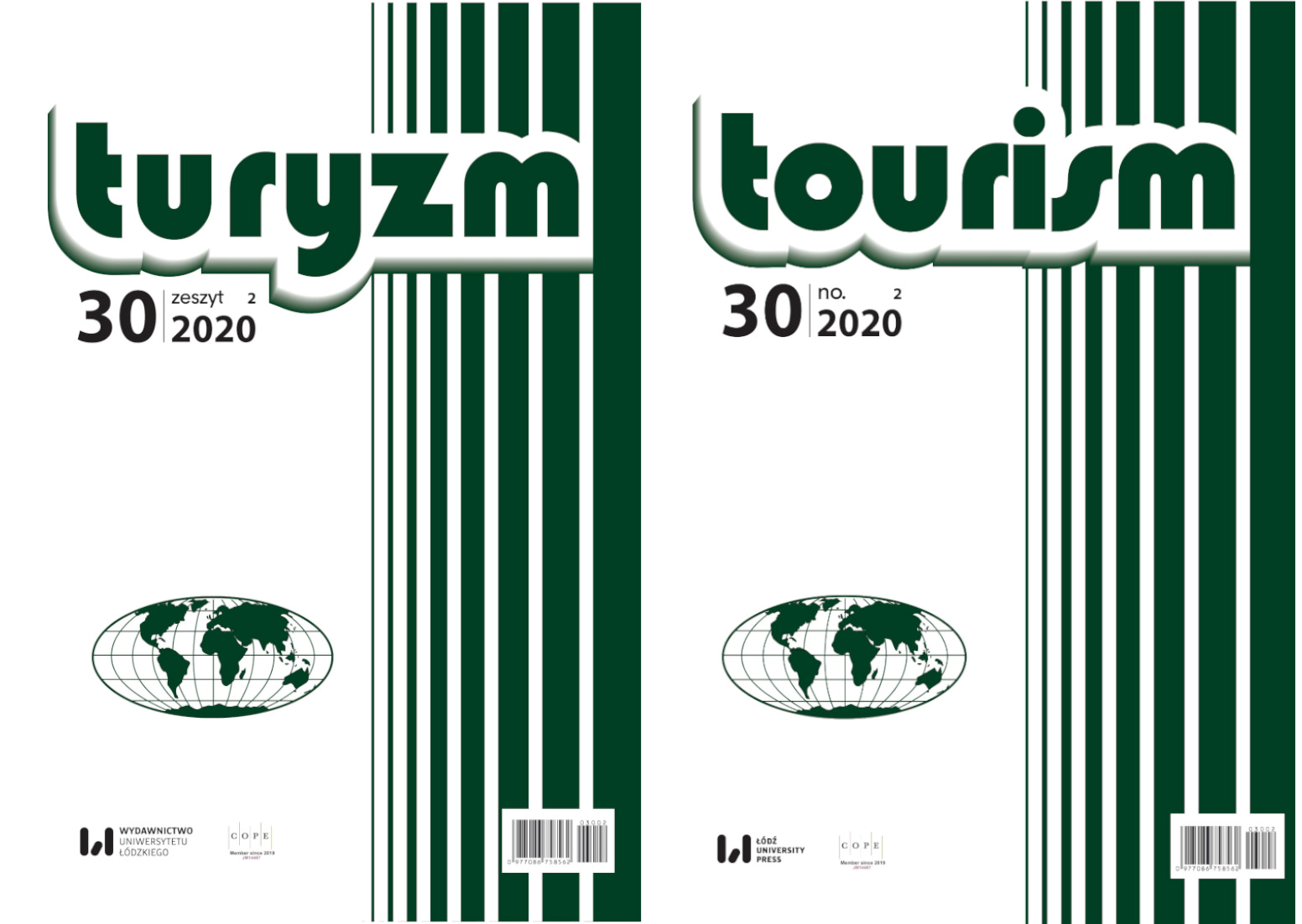Backpackerzy z pokolenia milenialsów o ryzyku związanym z podróżowaniem: ujęcie typologiczne
DOI:
https://doi.org/10.18778/0867-5856.30.2.05Keywords:
backpacking, ryzyko, milenialsiAbstract
Na potrzeby niniejszego artykułu analizie poznawczej poddano kategoryzację ryzyka wpisanego w doświadczenia podróżnicze backpackerów z pokolenia milenialsów. Podjęto także próbę jego usystematyzowania na bazie poznawczych, a także emocjonalnych wyróżników przedstawionych przez respondentów. Badania przeprowadzono w latach 2018–2020. W celu pozyskania respondentów posłużono się nielosowym doborem próby, zwanym metodą kuli śnieżnej (ang. snowball sampling). Badaniami objęto 409 backpackerów z pokolenia polskich milenialsów. Przeprowadzono z nimi pogłębione wywiady online, z których następnie wyodrębniono klucze kodowe, przypisano je bardziej znaczącym kategoriom oraz dookreślono zakresy tematyczne. Analiza zebranego materiału jakościowego posłużyła do podjęcia próby typologii ryzyka związanego z backpackingiem milenialsów i pozwoliła na wyodrębnienie pięciu jego zakodowanych kategorii. Pierwsza zawiera się w backpackerskiej postawie wobec podróży. Druga wpisana jest w poszukiwanie autonomii i niezależności. Trzecia (kalkulacja selektywna) wynika z zachowań adaptacyjnych, związanych z rachunkiem zysków i strat. Czwarta kategoria jest powiązana z potrzebami emocjonalnymi backpackerów i poszukiwaniem wrażeń. Z kolei ostatnia wiąże ryzyko z warunkami środowiskowymi oraz cechami kulturowymi obszaru recepcyjnego. Usystematyzowanie typologiczne ryzyka w backpackingu pozwala zrozumieć potrzeby tej grupy osób podróżujących i dostosować świadczone usługi do wymagań konkretnego pokolenia.
Downloads
References
Baran, M., Kłos, M. (2014). Pokolenie Y – prawdy i mity w kontekście zarządzania pokoleniami. Marketing i Rynek, 5, 923–929.
Google Scholar
Bellis, M.A., Hughes, K., Dillon, P., Copeland, J., Gates, P. (2007). Effects of backpacking holidays in Australia on alcohol, tobacco and drug use of UK residents. BMC Public Health, 7 (1), 1–10. DOI: https://doi.org/10.1186/1471-2458-7-1
Google Scholar
DOI: https://doi.org/10.1186/1471-2458-7-1
Carr, N., Poria, Y. (2010). Sex and the sexual during peoples leisure and tourism experiences. Newcastle: Cambridge Scholars Publishing.
Google Scholar
Desforges, L. (2000). Traveling the world. Identity and travel biography. Annals of Tourism Research, 27 (4), 926–945. DOI: https://doi.org/10.1016/S0160-7383(99)00125-5
Google Scholar
DOI: https://doi.org/10.1016/S0160-7383(99)00125-5
Elsrud, T. (2001). Risk creation in traveling. Backpacker adventure narration. Annals of Tourism Research, 28 (3), 597–617. DOI: https://doi.org/10.1016/S0160-7383(00)00061-X
Google Scholar
DOI: https://doi.org/10.1016/S0160-7383(00)00061-X
Falconer, E. (2011). Risk, excitement and emotional conflict in women’s travel narratives. Manchester: Metropolitan University.
Google Scholar
Fazlagić, J.A. (2008). Charakterystyka pokolenia Y. E-mentor, 3 (25), 13–16.
Google Scholar
Fischer, J., Rostami, S., Peet, A., Dean, J., Debattista, J., Allen, K. (2010). Sex, drugs and backpacking: Study report. Queensland: Alcohol Education & Rehabilitation Foundation Ltd.
Google Scholar
Fuchs, G. (2013). Low versus high sensation-seeking tourists: A study of backpackers’ experience risk perception. International Journal of Tourism Research, 15, 81–92. DOI: https://doi.org/10.1002/jtr.878
Google Scholar
DOI: https://doi.org/10.1002/jtr.878
Hunter-Jones, P., Jeffs, A., Fischbacher-Smith, D. (2007). Backpacking your way into crisis: An exploratory study into perceived risk and tourist behavior amongst young people. Journal of Travel & Tourism Marketing, 23 (2–4), 237–247. DOI: https://doi.org/10.1300/J073v23n02_18
Google Scholar
DOI: https://doi.org/10.1300/J073v23n02_18
Issahaku, A. (2015). Backpackers’ risk perceptions and risk reduction strategies in Ghana. Tourism Management, 49, 99–108. DOI: https://doi.org/10.1016/j.tourman.2015.02.016
Google Scholar
DOI: https://doi.org/10.1016/j.tourman.2015.02.016
Iyer, R., Reisenwitz, T.H. (2009). Differences in generation X and generation Y: Implications for the organization and marketers. Marketing Management Journal, 19 (2), 91–103.
Google Scholar
Jabłonkowska, J.B. (2015). Risk-taking factors in backpacker tourism. Zeszyty Naukowe Wyższej Szkoły Humanitas. Pedagogika, 11, 119–127.
Google Scholar
DOI: https://doi.org/10.5604/18998658.1186395
Jabłonkowska, J.B. (2017a). Backpackerzy polscy a zagraniczni. Wieloaspektowe studium porównawcze. Wrocław: AWF we Wrocławiu.
Google Scholar
Jabłonkowska, J.B. (2017b). Alkoholowe, narkotykowe i seksualne „rozhamowanie” backpackerów w świetle międzynarodowych badań porównawczych. Folia Turistica, 43, 153–166. DOI: https://doi.org/10.5604/01.3001.0010.7888
Google Scholar
DOI: https://doi.org/10.5604/01.3001.0010.7888
Kotler, P., Wong, V., Saunders, J., Armstrong, G. (2005). Principles of marketing. New Jersey: Prentice Hall FT.
Google Scholar
Kowalczyk-Anioł, J. (2012). Tourism trends among generation Y in Poland. Turyzm/Tourism, 22 (2), 15–20. DOI: https://doi.org/10.2478/v10106-012-0007-y
Google Scholar
DOI: https://doi.org/10.2478/v10106-012-0007-y
Kozak, M., Crotts, J.C., Law, R. (2007). The impact of the perception of risk on international travellers. International Journal of Tourism Research, 9 (4), 233–242. DOI: https://doi.org/10.1002/jtr.607
Google Scholar
DOI: https://doi.org/10.1002/jtr.607
Kubacka-Jasiecka, D., Passowicz, P. (2014). Dorastanie we współczesności. Postawy, wartości i doświadczanie czasu a kryzysy rozwoju pokolenia po transformacji. Czasopismo Psychologiczne – Psychological Journal, 20 (2), 171–182.
Google Scholar
Leggat, P.A., Shaw, M.T. (2003). Travel health advice for backpackers. Journal of Travel Medicine, 10 (6), 340–345. DOI: https://doi.org/10.2310/7060.2003.9361
Google Scholar
DOI: https://doi.org/10.2310/7060.2003.9361
Lepp, A., Gibson, H. (2008). Sensation seeking and tourism: Tourist role, perception of risk and destination choice. Tourism Management, 29 (4), 740–750. DOI: https://doi.org/10.1016/j.tourman.2007.08.002
Google Scholar
DOI: https://doi.org/10.1016/j.tourman.2007.08.002
Lupton, D., Tulloch, B. (2002). Life would be pretty dull without risk: Voluntary risk-taking and its pleasure. Health, Risk and Society, 4 (2), 113–124. DOI: https://doi.org/10.1080/13698570220137015
Google Scholar
DOI: https://doi.org/10.1080/13698570220137015
Patyra, A., Dłużewska, A. (2015). Backpacking – historia, ramy, rozwój. Turystyka Kulturowa, 11, 40–54.
Google Scholar
Pendergast, D. (2010). Getting to know the Y generation. W: P. Benckendorff, G. Moscardo, D. Pendergast (red.), Tourism and generation Y (s. 1–15). Cambridge: CABI, Oxfordshire. DOI: https://doi.org/10.1079/9781845936013.0001
Google Scholar
DOI: https://doi.org/10.1079/9781845936013.0001
Piyaphanee, W., Olanwijitwong, J., Kusolsuk, T., Silachamroon, U. (2012). Awareness, practices, and health problems of backpackers traveling during flooding in Thailand during 2011. Southeast Asian Journal Trop Med Public Health, 43 (5), 1193–1200.
Google Scholar
Piyaphanee, W., Wattanagoon, Y., Silachamroon, U., Mansanguan, C., Wichianprasat, P., Walker, E. (2009). Knowledge, attitudes, and practices among foreign backpackers toward malaria risk in southeast Asia. Journal of Travel Medicine, 16 (2), 101–106. DOI: https://doi.org/10.1111/j.1708-8305.2008.00282.x
Google Scholar
DOI: https://doi.org/10.1111/j.1708-8305.2008.00282.x
Potasman, I., Beny, A., Seligmann, H. (2000). Neuropsychiatric problems in 2,500 long-term young travelers to the tropics. Journal Travel Medicine, 7 (1), 5–9. DOI: https://doi.org/10.2310/7060.2000.00002
Google Scholar
DOI: https://doi.org/10.2310/7060.2000.00002
Reichel, A., Fuchs, G., Uriely, N. (2007). Perceived risk and the non-institutionalized tourist role: The case of Israeli student ex-backpackers. Journal of Travel Research, 46 (2), 217–226. DOI: https://doi.org/10.1177/0047287507299580
Google Scholar
DOI: https://doi.org/10.1177/0047287507299580
Ryan, C. (2003). Risk acceptance in adventure tourism: Paradox and context. W: J. Wilks, S. Page (red.), Managing Tourist Health and Safety in the New milennium (s. 55–65). Amsterdam: Elsevier Science. DOI: https://doi.org/10.1016/B978-0-08-044000-2.50009-2
Google Scholar
DOI: https://doi.org/10.1016/B978-0-08-044000-2.50009-2
Santos, M.C., Veiga, C., Águas, P. (2016). Tourism services: Facing the challenge of new tourist profiles. Worldwide Hospitality and Tourism Themes, 8 (6), 654–669. DOI: https://doi.org/10.1108/WHATT-09-2016-0048
Google Scholar
DOI: https://doi.org/10.1108/WHATT-09-2016-0048
Sönmez, S., Graefe, A. (1998). Determining future travel behavior from past travel experience and perceptions of risk and safety. Journal of Travel Research, 37 (4), 171–177. DOI: https://doi.org/10.1177/004728759803700209
Google Scholar
DOI: https://doi.org/10.1177/004728759803700209
Stewart, L., Leggat, P.A. (1998). Culture shock and travelers. Journal of Travel Medicine, 5, 84–88. DOI: https://doi.org/10.1111/j.1708-8305.1998.tb00469.x
Google Scholar
DOI: https://doi.org/10.1111/j.1708-8305.1998.tb00469.x
Tapscott, D. (2010). Cyfrowa dorosłość. Jak pokolenie sieci zmienia nasz świat. Tłumaczenie P. Cypryański. Warszawa: WAiP.
Google Scholar
Tsaur, S., Tzeng, G., Wang, K. (1997). Evaluating tourist risks from fuzzy perspectives. Annals of Tourism Research, 24 (4), 796–812. DOI: https://doi.org/10.1016/S0160-7383(97)00059-5
Google Scholar
DOI: https://doi.org/10.1016/S0160-7383(97)00059-5
Wantono, A., Mckercher, B., (2020) Backpacking and risk perception: The case of solo Asian women. Tourism Recreation Research, 45 (1), 19–29. DOI: https://doi.org/10.1080/02508281.2019.1636180
Google Scholar
DOI: https://doi.org/10.1080/02508281.2019.1636180
Watcharapong, P., Prapimporn, S., Weerapong, P., Piyada, U., Pongdej, W., Maneerat, B., Thitiya, P., Terapong, T. (2010). Rabies exposure risk among foreign backpackers in South-east Asia. The American Journal of Tropical Medicine and Hygiene, 82 (6), 1168–1171. DOI: https://doi.org/10.4269/ajtmh.2010.09-0699
Google Scholar
DOI: https://doi.org/10.4269/ajtmh.2010.09-0699
Yoda, T., Yokoyama, K., Suzuki, H., Hirao, T. (2017). Relationship between long-term flooding and serious mental illness after the 2011 flood in Thailand. Disaster Medicine and Public Health Preparedness, 11 (3), 300–304. DOI: https://doi.org/10.1017/dmp.2016.148
Google Scholar
DOI: https://doi.org/10.1017/dmp.2016.148
Zuckerman, M. (1994). Behavioral expressions and biosocial bases of sensation seeking. New York: Cambridge University Press.
Google Scholar
Downloads
Published
How to Cite
Issue
Section
License

This work is licensed under a Creative Commons Attribution-NonCommercial-NoDerivatives 4.0 International License.










